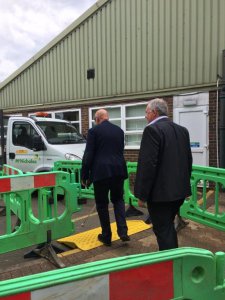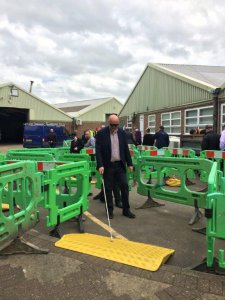Disability Awareness Training
The training we provide will be bespoke to your organisation and presented by people with disabilities.
The training provided is not e-learning nor based on DVD presentations. It involves participants gaining practical experience of situations encountered by persons with different disabilities.
The training gives those attending a perception into the problems that a person with a disability encounters in everyday life.
There are many disabilities that cannot be replicated and will be covered in discussions. The day also includes an insight into the main parameters of Equality legislations.
DW shows McNicholas and other companies the barriers and dangers of worksites.
Statement from McNicholas
“Putting vulnerable people first…”
Our (McNicholas) daily risk assessments are great tools to help us to check whether our sites are safe for our fellow workers, as well as members of the public, but a recent visit by Disability Watford and Guide Dogs as part of a Safety forum organised for UKPN, made the Safety and Sustainability team at McNicholas reconsider whether enough consideration is taken for blind and partially sighted members of the public.
The team experienced what it was like to be partially sighted by wearing specially modified glasses to replicate tunnel vision and other eye conditions as well as attempting simple tasks such as counting money, pairing socks and identifying what food was in tins. We then experienced what it was like to be partially sighted on one of our sites; our yard in Watford was converted into a typical worksite including barriers, work equipment, vehicles and a (Working) compressor. Members of the team were then blindfolded and invited to try and walk through the designated walkway without tripping over the deliberately placed compressor hose, bumping into the carelessly placed shovel or the protruding wing mirror, or indeed being led straight into the road because the barrier network hadn’t been closed off properly. Simple things that you expect people to be able to avoid easily can present real dangers to others with difficulties.
We’re now rolling out toolbox talks about the simple things we can do to ensure the potential dangers to everyone have been fully considered.

